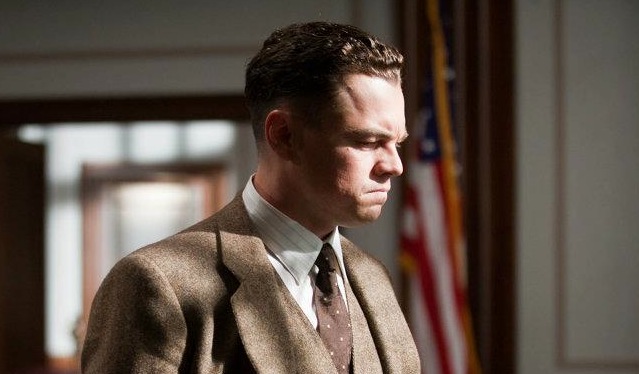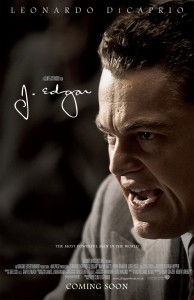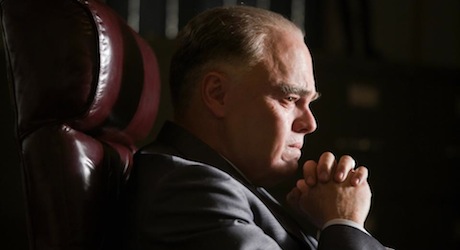Following a few reflections on his own life and career, Clint Eastwood tackles the life of J. Edgar Hoover, once the most powerful man in the United States and still a figure of controversy.
[stextbox id=”grey” caption=”J. Edgar (2011)” float=”true” align=”right” width=”200″]
Director: Clint Eastwood
Writer(s): Dustin Lance Black
Runtime: 137 minutes
Starring: Leonardo DiCaprio, Armie Hammer, Noami Watts, Judi Dench, Josh Lucas
Distributor: Roadshow
Country: US
Rating: Better Than Average Bear (?)
[/stextbox]
Clint Eastwood’s career in front of the camera has only been matched by his successful transition to one of the most critically praised American directors of the last few decades. Although we don’t get to see him on screen as much these days, with the exception of the superior Gran Turino, his steady hand continues to impress as a filmmaker. However, with last year’s mortality-centric Hereafter, many started to wonder if the elder statesman was beginning to lose his touch. With J. Edgar, Eastwood is back on more familiar turf.
J. Edgar is told in a fractured narrative, one in which an idealistic but serious young John Edgar Hoover (Leonardo DiCaprio) yearns to prove himself as a figure of power. The film divides its time between the young man who managed to rise to the top of the fledgling Federal Bureau of Investigation, driven by his stern mother (Judi Dench), and an aged Hoover (still DiCaprio under heavy prosthetics) who has lived his life amidst a sea of lies and obfuscation. It’s an unreliable memoir, told largely by the figure himself, but not one without a justifiable bit of sensationalism.
With J. Edgar, Eastwood continues his late career musings on the impermanence of life. While Hereafter focused on the collective human (melo)drama, J. Edgar‘s focus is the legacy one person can leave behind. One the one hand, Hoover was seen as a pioneer in streamlining procedure , and the central organisation, processing and forensic analysis of evidence. The origin of the modern CSI in many ways! Yet he also had dirt on everybody, a paranoid man who used his power for his own purposes. J. Edgar the film asks the big questions about what is left behind after a life is done. Given the trajectory of Eastwood’s films of late, one can’t help bunt feel that he may be reflecting somewhat on his own life and career.
J. Edgar does occasionally get mired in the sensationalism, with Dustin Lance Black‘s (Milk, Big Love) screenplay choosing to focus on the major events in Hoover’s life. It’s a whirlwind tour from the Bolshevik Bombings of 1919 and 1920, where Hoover’s crusade against communism began, his role in the Lindbergh baby kidnapping case, the famous bakrobbers of the 1930s (including Dillinger) and the civil rights movement of the 1960s. Pretty much everything in the 1940s and 1950s get skipped over, but this is necessity in a life-spanning saga such as this. In fact, Black’s script manages to get a career that spanned almost 50 years into just over two hours, and the highlights reel is a powerful one. Some knowledge of American history is perhaps necessary going in, and it more than occasionally comes off as self-important, but Eastwood’s vision of J. Edgar is a compelling one.
The central performances are mostly top-notch, with the simultaneously persuasive and paranoid Hoover shaped largely by his religious mother, who matter-of-factly states that she would rather have a dead son “than a daffodil”. DiCaprio’s performance is solid, overcoming the gimmick of the excellent prosthetics and delivering a vision of a troubled soul in a position of power. For the central vision of J. Edgar is about the man, and not simply the major events that made up that life. Much of the emotional core of the film comes from his relationships with his two most trusted companions, his lifelong secretary Helen Grady (Noami Watts) and protégé Clyde Tolson (Armie Hammer), with whom the closeted Hoover shares an unconsummated romance. It is their scenes that are often the strongest, filled with knowing glances and longing touches, although these too sare sometimes hampered by some clunky dialogue and Hammer’s age makeup on the verge of melting off his face in a few unfortunate Raiders of the Lost Ark moments.
As the film has the biased narrator of J.Edgar himself, via a motif that sees him writing his memoirs, it is up to the audience as to how much of the film is to be taken on face value. The ultimate test of a biopic is whether we have learned anything new about the protagonist by the time the lights come back up, and J.Edgar brings us a few steps closer to understanding what drives a young man who is interested in card cataloguing to become the most influential lawman of the twentieth-century.
[stextbox id=”custom”]Although this may be a self-important biopic, and doesn’t have quite the scope of an Oliver Stone equivalent, Eastwood’s reliable camera shoots Hoover in a new light, providing a view of the politics of fear and individual interest that still resonates in today’s climate.[/stextbox]
J. Edgar is released in Australia 26 January 2012 from Roadshow Films.






